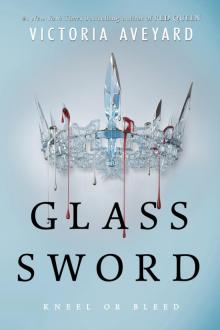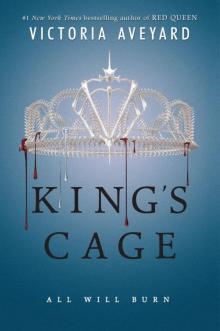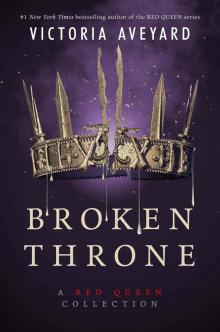- Home
- Victoria Aveyard
Broken Throne Page 17
Broken Throne Read online
Page 17
Ah. It clicks in my head. “I suppose you want your uncle to think you died with the rest?”
She nods, her face betraying no emotion. “I do.”
A Silver princess abandoning her kingdom, dead to all who knew her. And wanting to stay that way. I’m intrigued, to say the very least.
Perhaps not all rat days are the same.
The choice is already made in me. The offered gold, ten times the usual rate, will go far on the river and among my crew. I can’t speak for the others, but most of my share will go back to my mother, for safekeeping. I angle my shoulders away from the princess, opening the deck to her. I trail a hand, waving her toward the shallow benches backed by the stocked cargo hold.
“Find a seat and stay out of the way,” I tell her, shifting my focus back to my scurrier still in the river. “Ean, the family in blue cloaks. See what they’re offering.”
Lyrisa doesn’t move, her manner calm. She’s used to getting what she asks for, or demands. “Captain, I’m paying you to take me and me alone downriver. I have need of speed.”
“Very well, Silver,” I reply, turning to lean over the side of the keel. Below me, Ean has one hand on the rope ladder, ready to climb back aboard. I wave him off as Lyrisa takes a seat, arms crossed.
I speak louder than I must.
“Ean, the blue cloaks.”
There is only one captain aboard my keel.
TWO
Ashe
She tosses her rancid coat into the river once we’re moving, not bothering to watch as it floats in the current and tangles in the roots along the bank. It stains the water as it goes, swirling with dirt and worse. I suppose it must be blood or excrement or both. Not that I’ll bother asking. I’ve ferried Silvers before, and the river runs easy when we keep our distance from them.
The Red family we took on knows that too. They’re a pair of mothers, one dark-skinned and one light, who keep their two children angled away from the Piedmont princess, all avoiding her eye line. She doesn’t seem to mind and leans back on her elbows, enjoying the ample room their absence affords her.
Gill throws a glare at her from his place at the side, long pole in hand. He pushes methodically, navigating us around rocks and high riverbed. He has more reason to hate Silvers than most, but he keeps his temper in check. I pass by him on my way to the prow of the keel, giving his shoulder a squeeze.
“Just to the Gates,” I mutter, reminding him of our goal. Two weeks only, if we’re lucky in the current and the patrols. I’ve run the Gates in less time, but I’d rather not push the keel or the crew. Besides, it looks to be an easy river. No use making things more complicated than they need be.
“To the Gates,” he echoes. It isn’t difficult to hear the words unspoken. And not one second longer.
I nod to him. The Piedmont princess will be gone soon enough.
We know the path to the Gates like the back of our scarred hands, like the deck of the keel. Down the Ohius to the confluence, that’s the worst stretch. To our right, north, is the Lakelander bank, the borderline of the Crownlands drawn right up to the water’s edge. To the left, south, stretches the Freelands. This far northeast, it’s woodland and fields, mostly overgrown. Should a Lakelander patrol decide to try us here, we’d have no choice but to flee overland. Keels are fast but not faster than vehicle transports, and are little use if a powerful nymph decides to turn the river against us. I’ve only felt the water push back once, and that was enough. I don’t intend to face it again.
I check our progress against the other keels and captains. Old Toby is already gone from view, lagging behind. Her Scarlet Guard business must require slow movement, or many stops along the border. I certainly don’t envy her such a job. Nor do I have any desire to throw my lot in with those rebels, no matter how sweet their words may sound. They certainly don’t make for an easy job or an easy river.
Hallow is about a hundred yards ahead, his keel riding low in the water. He’ll probably stay in sight until we reach the confluence, where the Ohius and Great River meet. Then he’ll spend a day or so dumping cargo to go upriver north. I won’t see him again until the Gates.
At the prow I can see far, the Lakelands stretching in clear-cut fields of wheat and corn. Half-height. Summer is coming on, and by fall these fields will be stripped bare for winter. Every year I pass the workers, watching the Reds sweat and toil for their distant overlords. Sometimes they run to the bank when they see us, begging for passage. We never take them. Patrols are too close and farmworkers have too little coin. A few make the journey on their own, though, building boats on the bank through the summer. We help those along if we can, out of Silver sight.
Quick, light footsteps on the deck shake me out of my thoughts as one of the passenger children scuttles up next to me, her eyes wide in a golden face framed by curly brown hair. She looks afraid. I grin at her, if only to keep the kid settled. The last thing I need is a screaming child. She immediately grins, pointing at my mouth, then to her own tooth.
“You like that?” I murmur, running a tongue over my gold incisor. It replaced a tooth knocked out in a fight in Memphia. A fight I won.
“Your tooth is shiny,” she exclaims giddily. She can’t be more than eight.
I glance back up the deck, at her mothers pressed together on the bench. They look on, apprehensive. I wonder if the child is adopted, or born of one of the women. Probably the latter. She has the same look as the paler one, the same spark in her eyes.
Gently, I nudge her back toward her family. Cute as the kid is, I don’t want to interact with her any more than I must. It’s easier that way. “You should go sit down. I’ve got work to do up here.”
She doesn’t move, still staring. “You’re the captain,” she says, persistent.
I blink at her. Even though keelboat crews don’t have any kind of insignia or markings to denote officers, it’s clear where I stand on my deck. “Yes.”
“Captain what?”
Nodding, I nudge her again, this time moving with the child so she has to follow. “Ashe,” I offer, if only to get her going.
“I’m Melly.” Then her voice drops to a whisper, one hand suddenly clutching mine. “There’s a Silver on the boat.”
“I’m very aware of that,” I mutter, prying my fingers from hers.
At the benches, I catch the Piedmont princess watching despite her lazing appearance. She glances at us beneath her lashes, pretending not to look. A good tactic. A smart one.
“Why did you let her on?” The little girl continues without any concern for the rest of the ship—or those who might overhear.
From her position at the side, Riette shoots me a smirk as she poles the river. I grimace in reply. Somehow the rat kids always gravitate to me, and somehow I keep letting them.
“Same reason I let you on,” I tell her, sounding short and gruff. Just let me work, kid.
“They’re dangerous,” she whispers back. “I don’t like them.”
I don’t bother to drop my voice. Let the Silver princess hear me. “Neither do I.”
One of the Red mothers, the pale one, gratefully reaches for her daughter when I push her over. She has short-cropped hair the color of wheat. “Apologies for Melly, sir,” she says, pulling the child close. Not out of fear, but out of respect. “You sit still now.”
I nod curtly. It isn’t in me to scold passengers, especially those fleeing a civil war. “Just keep out of the hold and out of the way.”
The other Red mother, holding tight to their young boy, smiles warmly. “Of course, sir.”
Sir seems to bounce off my skin. Though this is my keel and my crew, my river hard-earned, I never get used to it. Two grown women calling me such a thing still feels odd. Even if it’s true. Even if I deserve it.
As I leave the couple, I pass by the princess. She’s still stretched out, taking more room than she should. The Silver angles her chin to survey me. All thoughts of inadequacy or unworthiness vanish. If there’s anyone who doesn’t d
eserve my respect, it’s a Silver.
I harden under her attention, losing any warmth.
“When do we eat, Ashe?” she asks, one hand idly tapping the bench. Overhead, the strengthening summer sun forces her to shade her eyes with the other hand.
Ashe.
The Red child bristles before I can, leaning around one of her mothers.
“He’s a captain, miss,” she says, her voice wavering. I can’t fathom the bravery it must take for her to speak to a Silver at all, let alone correct one. She’d make a fine keel captain herself one day.
Her mother hushes her quickly, pulling her back into place.
I shift if only a little, putting more of myself between the child and the Silver, in case the latter takes offense.
But she doesn’t move, her focus entirely fixed on me.
“We eat at sundown,” I tell her evenly.
Her lip curls. “No lunch?”
On the bench, one of the Red mothers shifts a foot slowly, pushing her pack farther out of sight. I almost smirk. Of course they had the common sense to bring provisions for the journey.
“When I said we, I meant my crew,” I tell the Silver, each word sharp as a knife. “You didn’t bring any food for yourself?”
The tapping hand ceases movement but doesn’t clench. The gun at my hip hangs heavy. I don’t expect a desperate Silver fleeing her homeland to attack us over a meal, but it doesn’t hurt to stay vigilant. Silvers aren’t used to being denied anything, and they don’t react well to hardship.
She grimaces, showing white, even teeth. Too perfect to be natural. She must have had them knocked out and regrown by a skin healer. “Certainly my rate covers board.”
“That wasn’t part of our original deal. But you can pay for food if you’d like,” I say. Her coin already given is for speed and silence and no questions. Not meals. And despite the money she’s already paid out, I’m the one in position to bargain. Not her. “That’s certainly an option.”
Her eyes don’t leave mine, but one of her hands brushes over the coin purse hooked to her belt. Weighing the gold left, listening to the subtle clink of metal. It’s not an insubstantial amount. But still she hesitates to pay, even to feed herself.
The princess is saving her money. For more. For worse. For a longer journey than the river. I’d wager all the cargo in my hold she doesn’t plan to stop at the Gates. Like before when she first landed on my deck, I’m intrigued.
Her expression changes, wiping clean. She sniffs and I get the sense of being dismissed like a courtier or a servant. One of her fingers twitches, as if remembering the urge to wave off a worthless Red.
“Do you dock anywhere along this stretch of the Ohius?” she asks, turning her head to survey the Freeland side of the river, where the Lakelands and a Silver crown hold no sway. The woodlands tangle into darkness, even in the morning sun. Her question and interest puzzle me only for a second.
Princess Lyrisa plans to hunt for her supper.
I survey her again, now that she’s lost the coat. Her clothes are as fine as her boots, a dark blue uniform. No jewelry, no adornment. She has no weapons that I can see either, so her ability must allow her to bring down game. I know noble Silvers are trained to war as much as soldiers are, trained to fight one another for sport and pride. And the thought of one so powerful on my keel unsettles me deeply.
But not enough to turn away her money. Or stop antagonizing her.
I take a step back, grinning sharply. Her eyes narrow. “We don’t dock until the confluence the day after tomorrow,” I say.
One of her hands darts, and the coin sails end over end, a flash of gold in the sun. I catch it deftly, enjoying my own triumph and her poorly disguised disdain.
“A pleasure having you on board, Princess,” I call over my shoulder as I walk away.
The sunset turns the river bloodred, lengthening every shadow until we seem to swim through darkness. At the prow, Gill keeps watch for errant logs or drifting sandbars. Crickets on the bank and frogs in the shallows sing. It’s a quiet night on the Ohius, an easy current drawing us farther southeast. I hope, when it’s my time, I die on a night like this.
When Big Ean doles out supper, I expect the Silver to balk at the quality of our food. It’s not terrible, but our provisions certainly aren’t up to the standards a princess would be used to. Instead she takes what she’s given without a word, then eats quietly by herself on her bench. Salt jerky and hard biscuits seem to go down as easily as the finest desserts in Piedmont.
The rest of us gather on the deck, circled up on crates or the deck itself to eat. The pair of kids, Melly and her older brother, whose name I’ve learned is Simon, are already asleep against their mothers, their bellies full. The parents, named Daria and Jem, split their provisions evenly before offering some to us.
Riette waves them off before anyone else can, her gap-toothed grin wide. In the soft electric light of the keel, she looks worn, her scars of the river more pronounced. She’s ten years my elder, but new to the keel life. Barely a year on my deck. She’s Freeland born, raised without allegiance or obedience to any crown. Same as me, same as Hallow. We have a different way about us, the Freeland Reds.
“Long road?” Riette says kindly to the mothers, pointing with a biscuit at the kids.
The darker woman, Jem, her hair and eyes black as gunpowder, nods. “Yes,” she says. One hand absentmindedly strokes Melly’s curls. “But Melly and Simon have been warriors through it. It’s taken a long while to reach the Disputed Lands.” Disputed. That’s what Crownlanders call us. As if we are something for the Silvers to fight over, and not a country unto ourselves, free of their rule. “We’ve come all the way from Archeon.”
In my mind’s eye, a map unfurls. Archeon is hundreds of miles away. I speak around a bite of jerky. “Servants.”
“We were,” Jem replies. “When the rebels attacked the king’s wedding, it was easy to slip away in the confusion, escape the palace, flee the city.”
News travels well along the river, and we heard about the Nortan king and his ill-fated wedding a month ago. The king lived, but the Silvers certainly felt the sting of the Scarlet Guard and the Montfort troops. Things have only deteriorated since, we hear—civil war in Norta, a Scarlet Guard insurgency, Montfort moving steadily east. And news of it all finds its way downriver eventually, carried on the war current.
From outside our circle, a voice sounds.
“You served Maven?” the princess asks. She stares at Jem, her face inscrutable in the weak light of the keel.
Jem doesn’t quail under her gaze. She tightens her jaw. “Daria worked in the kitchens. I was a lady’s maid. We had little to do with the king.”
The Silver is undeterred, her supper forgotten. “Then his wife. The Lakelander princess.”
“She had her own servants from her country to serve her directly.” Jem shrugs. “I was a queen’s servant, though, and in the absence of a queen, I served the prisoner. Not directly, of course—no Red was allowed near her—but I carried her linens, her food, that sort of thing.”
Big Ean brushes biscuit crumbs from his short beard, dusting his crossed legs. “The prisoner?” he says, eyes narrowed in confusion.
The princess’s voice is stern. “You’re talking about Mare Barrow.”
This only deepens Big Ean’s bewilderment. He glances at Riette for an explanation. “Who’s she?”
She sighs loudly, rolling her eyes at him. “The Scarlet Guard girl.”
“Oh right,” Big Ean replies. “The one who ran off with that prince.”
Another cluck of annoyance escapes Riette. She swats him. “No, idiot, the one with an ability. Lightning. Like a Silver but not. How could you forget her?”
Big Ean just shrugs his massive shoulders. “Dunno. Red running off with a prince sounded more interesting.”
“They’re the same person,” I grumble, shutting them both up.
Just because we get news doesn’t mean we get it properly, in ord
er, or entirely true. Some Rivermen and Freelanders spend their days sorting out what’s going on outside our borders, in the chaos that rules the Crownlands. Personally, I don’t bother with the rumors and just wait to see what solidifies into truth. Hallow cares more about any of it than I do, and tells me what I need to know.
“And Barrow isn’t a prisoner,” I add. I saw one of her broadcasts myself when I was far upriver, when the Red girl decried the Scarlet Guard and their agenda. She wore jewels and silk and spoke of the king’s kindness and mercy. “She joined up with the Nortan king willingly.”
On her bench, the Piedmont princess laughs sharply into her cup of water.
I cut a glance at her, only to find her already sneering. “Something funny about that?”
To my surprise, it’s Jem who answers. “The girl certainly was a prisoner, sir. No doubt about that.” Next to her, Daria bobs her head solemnly. “She spent most days locked in a room, guarded and chained, brought out only when that conniving little boy wanted to toy with her or use her voice to sow dissent.”
The rebuke is soft, but my stomach churns uncomfortably. If that’s true, then that’s a punishment I can’t imagine. I try to picture more of the lightning girl in my head. I remember the broadcast, her voice, but her face is obscure. I’ve seen it before, I know it. Brown hair, sharp eyes. But that’s all that comes. I can say the same of the monarchs ruling the Crownlands. A teenage boy rules Norta, the bejeweled Prince Bracken holds sway in Piedmont, a nymph king and queen control the Lakelands.
Jem’s gaze is still sharp on me, and I feel scolded in the lightning girl’s name. It’s my own fault. I try to stay out of things, try to keep my focus on what’s right in front of me. I don’t bother with great and terrible people of the world. I only know what I must of them to stay alive, stay ahead, and nothing more. And even that, it seems, is flawed.
I return to my meal in silence.
“Did you know any of them?” Jem asks, bold enough to address the princess with such a question.

 Red Queen Novella #2
Red Queen Novella #2 Red Queen Novella #1
Red Queen Novella #1 Red Queen
Red Queen War Storm
War Storm Glass Sword
Glass Sword King's Cage
King's Cage Broken Throne
Broken Throne